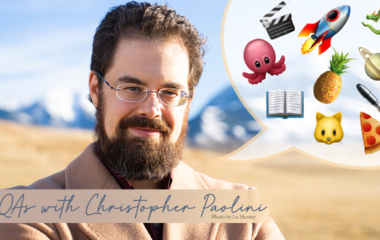
In Eldest, Arya tells Eragon that she can talk with him from the gates of Vroengard to the other side of Alagaësia. Why can Arya speak from such a long distance and Eragon and Saphira can’t? Especially since he is now as strong as an elf. And why could she not speak with him when he was in the Empire?
Oh boy . . . You sure know how to ask tough questions! Okay, here goes:
1. In Brisingr, Arya couldn’t talk with Eragon when he was alone in the Empire because:
a. She didn’t know where he was.
b. He was shielding his mind from all possible contact in order to avoid detection by Murtagh or any other of Galbatorix’s magic-wielding minions. (Wonderful word, minions.)
2. As I looked back on the exchange you mentioned between Arya and Eragon in Eldest, I realized why you got confused. It’s my own fault; I made an assumption that seemed perfectly sensible to me at the time, but which I should have explained a bit more clearly to everyone else. For those who don’t remember, the pertinent section is (from page 148):
Arya nodded toward where Saphira undulated through the water. “I grew accustomed to Saphira’s presence during the fifteen years I guarded her egg. I was reaching out for anything that felt familiar when I touched your dreams.”
“Are you really strong enough to contact someone in Teirm from Gil’ead? Especially if you were drugged.”
A ghost of a smile touched Arya’s lips. “I could stand on the very gates of Vroengard and still speak with you as clearly as I am now.”
When he asked his question, Eragon was asking about telepathy. That is, could Arya touch someone’s mind in Teirm all the way from Gil’ead? Arya was not answering that question specifically, but rather the more general question, “Could you contact someone in Teirm all the way from Gil’ead?” And she could, only not with telepathy. Using the right spell, Arya could speak to Eragon from across the whole width of Alagaësia, even as Eragon speaks with Queen Islanzadí and others when he scrys them in Brisingr.
Arya’s actually being rather glib here.
The thing to remember is that when Eragon saw Arya in his dreams, they weren’t engaged in telepathy; they didn’t exchange any thoughts or feelings, nor could they have even if they wanted to. What happened was that Arya transmitted (to use a modern term) an image of herself and her surroundings into Eragon’s eyes/visual cortex, much the same way that two people who are scrying each other can transmit images of themselves and their surroundings onto a mirror or any other reflective surface in front of the other person. (Again, as in Brisingr.) And why can spellcasters do that but not read minds at great distances? Well that leads to my next point:
3. Scrying and telepathy are fundamentally different processes. Both move objects from one point to another, but what they move isn’t the same.
a. Scrying involves reproducing the light at one location at another. The information required to do this is conveyed via electromagnetic radiation (visible or not) from point A to point B. By scrying another place, what a magician is doing is, essentially, funneling a stream of photons encoded with the visual information from his target to his own location, then reproducing that visual information on some sort of reflective surface—or even in his own eyes, if he’s particularly skilled. Since photons weigh next to nothing, moving them across great distances requires only a negligible expenditure of energy, although it does get slightly harder to scry the farther away your target is. None of this happens consciously, of course, but that’s the basic mechanism underlying the spell.
i. Because scrying relies on electro-magnetic energy, a spellcaster in Alagaësia could scry a dark room and see what it contained, if they knew enough to convert infrared radiation into visible light. By extension, lead, or other similarly dense materials, can block attempts to scry through them, which is why certain caves in Alagaësia are impervious to scrying . . . at least when using normal methods. There are even more advanced techniques, which I won’t go into here.
ii. Conveying speech from one person to another requires, in most cases, both parties to be active participants. Person A can transmit the information concerning her speech to person B (or person B can be the one to record A’s speech and then transfer it to his own location) but, in either case, B has to be the one to reproduce A’s speech, and A has to be the one to reproduce B’s speech. Why? Because reproduction involves creating vibrations in the air, something which is simply too arduous for anyone to do over more than a few miles. This is why, in Eldest, Eragon was able to scry Nasuada from Ellesméra and listen to her speaking with King Orrin, but he couldn’t speak to them in return, since they weren’t set up to reproduce his words with an enchanted mirror or some other device.
b. Telepathy, on the other hand, involves actually manipulating physical elements (neurons, synapses, various chemicals, etc.) within another person’s brain, which is how one person is able to impress their thoughts and feelings onto the consciousness of another. It doesn’t require a huge amount of energy—less than speaking, most often—but, as with moving anything, it becomes exponentially more difficult as the distance between the two people, or other creatures, increases. Some amount of connection can be maintained over great distances, which is why Eragon and Saphira have a vague sense of each other’s well-being, or lack thereof, when they are far apart, but it’s not enough to allow an exchange of thoughts.
i. If the person whom you are communicating with isn’t a telepath as well, then you end up doing double duty—whether you are aware of it or not—as you have to both manipulate their mind and your own, so that you can share in their thoughts and feelings. Otherwise, you would push yourself into their consciousness, but you wouldn’t receive anything back. It would be very much a one-sided conversation.
4. Hope that answers your questions!
5. And yes, I spend a lot of time thinking about this.
6. . . . .
7. Too much time probably . . . but I enjoy it.




